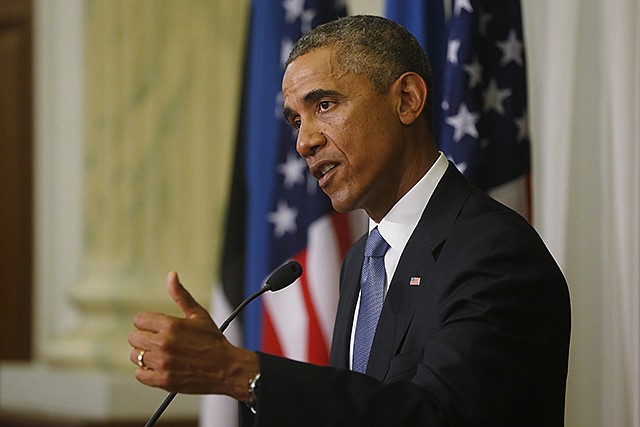TALLINN, Estonia (AP) - Lashing out at Russia, President Barack Obama on Wednesday cast Moscow's aggression in Ukraine as a threat to peace in Europe. He vigorously vowed to come to the defense of NATO allies that fear they could be Vladimir Putin's next target.
"You lost your independence once before," Obama said following meetings with Baltic leaders in the Estonian capital of Tallinn. "With NATO, you'll never lose it again."
Obama, who faces criticism in the U.S. for being too cautious in confronting Russian President Putin, sharply condemned Moscow's actions. He declared in blunt terms that Russian forces that have moved into Ukraine in recent weeks are not on a humanitarian or peacekeeping mission, as the Kremlin has insisted.
"They are Russian combat forces with Russian weapons in Russian tanks," he said during a speech at a packed concert hall.
Obama also rejected one of Russia's main rationales for its actions in Ukraine: the protection of Russian speakers living outside its borders. Like Ukraine, Estonia and other Baltic nations have sizeable Russian-speaking populations, compounding their fears that Moscow could seek to intervene inside their borders.
"We reject the lie that people cannot live and thrive together just because they have different backgrounds or speak a different language," Obama said.
Despite the president's tough talk, the U.S. and Europe have been unable to shift Putin's approach in the months-long crisis in eastern Ukraine. While multiple rounds of Western sanctions have damaged Russia's economy, the penalties have not pushed Putin to end what the White House says is unchecked support for pro-Moscow separatists who have stirred upheaval in key cities.
Obama offered no new options for penalizing Russia beyond more sanctions, and reiterated his opposition to the U.S. becoming involved in the conflict militarily.
The Pentagon said Wednesday that 200 U.S. soldiers will participate in an exercise in western Ukraine starting next week. Though distant from the conflict with Russian-backed separatists, they would be the first presence of American ground troops in Ukraine since the crisis began. The annual exercise, called Rapid Trident, involves forces from 15 nations and will not involve live firing of weapons.
The Pentagon also announced it has delivered more non-lethal aid to the Ukrainian military, including helmets, explosive ordnance disposal robots, sleeping mats, jackets, radios, body armor and first-aid kits.
On Wednesday evening, Obama flew from Estonia to Wales, where a high-stakes NATO summit will get underway Thursday. The alliance is expected to approve plans to station more troops and equipment in Eastern Europe, with the aim of building a rapid response force that could deploy within 48 hours.
He addressed U.S. and Estonian troops at the airport before leaving.
"You're sending a powerful message that, as NATO allies, we stand together," Obama said. "We stand as one."
He earlier had announced that he was sending more Air Force units and aircraft to the Baltics, and called Estonia's Amari Air Base an ideal location to base those forces.
Shortly after the president arrived in Estonia Wednesday morning, there was a brief flicker of hope for a resolution to the conflict. The Ukrainian president's office announced that it had reached a cease-fire agreement with Putin. But the statement was ambiguous, and a top rebel figure quickly said no cease-fire was possible without Ukraine withdrawing its forces.
Estonia and other countries in the region that were once under Soviet control have been warily eying Putin's actions and fear he could set his sights on their nations next. Unlike Ukraine, the Baltic states of Estonia, Latvia and Lithuania are NATO members, and have been seeking firm commitments that the U.S. and other alliance powers would come to their defense if Russia were to encroach on their territory.

